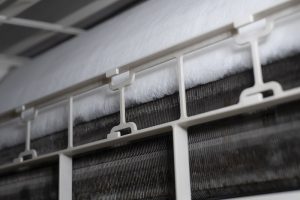Did you know that it’s possible for the evaporator coils inside of your air conditioner to develop ice? That’s right, they can ice over and stop functioning to cool your house down as the ice blocks the coils from airflow. When this happens, you need to call for air conditioning repair in Madison.
You can keep reading to learn more about the risks of frozen evaporator coils and why you want to address the problem sooner rather than later. We are going into more detail about how coils freeze and highlighting the signs that you can watch for to indicate frozen coils so you can call for service sooner rather than later.
The Concern With Ice
It’s possible for ice to develop on both the indoor and outdoor portions of your AC coils. Ice developing on the outdoor condenser coils is rare, but it can still happen. During the colder months of the year, it is common to see ice beginning to develop on the outdoor portion of your AC unit, but it should thaw and not remain icy for too long. If you see ice day after day on the outdoor unit, it’s a good idea to call for service.
Ice poses a variety of risks for your AC. It can block the unit from being able to cool air, resulting in a hotter and more humid environment. It can also thaw and leak out, causing water damage to the AC and surrounding parts of your home.
What Causes Frozen Coils?
Right now it’s summer and the bigger concern is ice developing on your indoor evaporator coils. Ice may seem like a big problem–and it is–but it’s really the result of some other problem. The most common cause of frozen coils is a lack of airflow into your air conditioner. After all, without enough air to cool down, your AC is working hard to produce results without the resources it needs.
The refrigerant lines inside your home are designed to absorb heat from the air. Without any air, the lines stay cool and may begin to frost over. This is especially a risk if the environment inside your AC is humid. Over time, that frost thickens until it becomes ice.
Blockages are a common reason for poor airflow. They can happen because the air filter is dirty and clogged, preventing airflow into the system. Or there may be a blockage somewhere between the filter and the coils, preventing air from entering the system fully.
It’s also possible that a refrigerant leak is contributing to icy evaporator coils. Refrigerant is a chemical that isn’t designed to be outside of the airtight lines. When it leaks out, refrigerant levels inside the lines drop down until there isn’t enough charge to remove heat from the air. The temperature inside the lines is dropping, while warm air outside is contributing to ice buildup.
Call Touchstone Heating and Air 24/7 for exceptional customer service! Serving the communities of North Central Florida since 1998.

